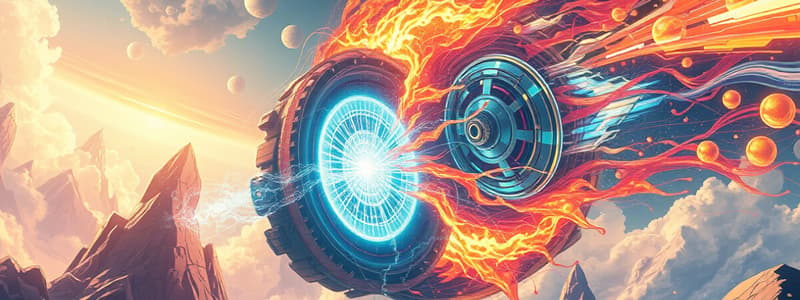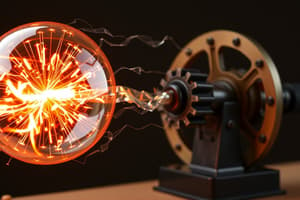Podcast
Questions and Answers
What are the energy transformations in a flashlight?
What are the energy transformations in a flashlight?
Chemical energy -> Electrical energy -> Light energy
What are the energy transformations as you eat food and then walk to class?
What are the energy transformations as you eat food and then walk to class?
Chemical energy -> Mechanical energy
What energy transformations happen as a wind turbine is spun by the wind and then is transferred into electricity?
What energy transformations happen as a wind turbine is spun by the wind and then is transferred into electricity?
Mechanical -> Electrical energy
What is potential energy?
What is potential energy?
What is kinetic energy?
What is kinetic energy?
What is a compound?
What is a compound?
What is an element?
What is an element?
What is energy?
What is energy?
Where does a roller coaster have potential energy?
Where does a roller coaster have potential energy?
Where does a roller coaster have kinetic energy?
Where does a roller coaster have kinetic energy?
What is a chemical reaction?
What is a chemical reaction?
What is a physical reaction?
What is a physical reaction?
Flashcards are hidden until you start studying
Study Notes
Energy Transformations
- Flashlight transforms chemical energy stored in batteries into electrical energy, which is then converted into light energy.
- When food is consumed, chemical energy is converted into mechanical energy as the body performs physical activities like walking.
Wind Turbines
- Wind turbines convert mechanical energy from wind movement into electrical energy that can be used for power.
Types of Energy
- Potential Energy: Energy that is stored within an object or system, capable of being released to do work.
- Kinetic Energy: Energy associated with the motion of an object, increasing as the object's speed increases.
Chemical and Physical Changes
- Compound: A substance formed from two or more different elements chemically bonded.
- Element: A pure substance consisting of only one type of atom, cannot be broken down into simpler substances.
- Energy: Defined as the capacity to perform work in a system or process.
Roller Coaster Energy
- A roller coaster has maximum potential energy at the top of a hill where it is elevated.
- Kinetic energy is at its peak when the roller coaster is at the bottom of a hill, moving at high speed.
Reactions
- Chemical Reaction: A process that results in the formation of a new substance, often involving the breaking and forming of bonds.
- Physical Reaction: A process that alters the physical form of a substance without changing its chemical identity, thus no new substance is created.
Studying That Suits You
Use AI to generate personalized quizzes and flashcards to suit your learning preferences.




